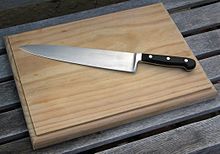haktabulo
Apparence
Étymologie
[modifier le wikicode]- (Date à préciser) Composé des racines hak (« hacher ») et tabul (« planche ») et de la finale -o (substantif).
Nom commun
[modifier le wikicode]| Cas | Singulier | Pluriel |
|---|---|---|
| Nominatif | haktabulo \hak.ta.ˈbu.lo\ |
haktabuloj \hak.ta.ˈbu.loj\ |
| Accusatif | haktabulon \hak.ta.ˈbu.lon\ |
haktabulojn \hak.ta.ˈbu.lojn\ |

haktabulo \hak.ta.ˈbu.lo\
- (Cuisine) Planche à découper.
- Exemple d’utilisation manquant. (Ajouter)
Apparentés étymologiques
[modifier le wikicode]→ voir la catégorie Mots en espéranto comportant la racine hak ![]()
- haki (« hacher, couper »)
- hakilo (« hache »)
- hako (« coup »)
- hakado (« action de hacher, hachage, hachement »)
- hakaĵo (« du haché »)
- haketi (« hacher (de la viande, des oignons) »)
- haketaĵo (« hachis »)
- hakilego (« très grande hache »)
- hakileto (« hachette »)
- haktranĉilo (« serpe »)
- hakisto (« hacheur »)
- arbohakisto (« bûcheron »)
- arbohakistino (« bûcheronne »)
- ŝtonhakisto (« tailleur de pierre »)
- batalhakilo (« francisque »)
- brikhakilo (« ciseau de maçon »)
- hakfosilo (« houe »)
- haktabulo (« planche à découper »)
- hakfunkcio (« fonction de hachage »)
- hakvaloro (« valeur de hachage »)
- haktabelo (« tableau de hachage »)
- ĉirkaŭhaki (« tailler (une pierre) »)
- dehaki (« ôter, enlever, couper, tailler (un arbre) »)
- hakfaligi (« abattre »)
- dishaki (« couper en morceaux, trancher par la hache »)
- elhaki (« extraire par la hache ou outil similaire »)
- forhaki (« faire disparaître par la hache »)
- trahaki (« percer par la hache »)
- manhakilo (« hachette, petite hache à main »)
Prononciation
[modifier le wikicode]- France (Toulouse) : écouter « haktabulo [Prononciation ?] »
Références
[modifier le wikicode]Bibliographie
[modifier le wikicode]- haktabulo sur le site Plena Ilustrita Vortaro de Esperanto (PIV)
